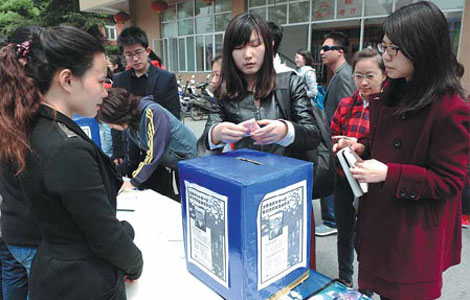Maritime dispute to be addressed
Updated: 2013-05-12 07:46
By Zhao Shengnan (China Daily)
|
|||||||||||
Beijing and Hanoi say relations will be boosted by negotiation, dialogue
China and Vietnam on Saturday pledged to boost comprehensive cooperation, including in the maritime field, with an agreement to address the South China Sea issue.
The two neighbors should effectively control and properly handle disagreements in the South China Sea through negotiation and dialogue mechanisms, and "strengthen maritime cooperation by transferring disparities into opportunities", said State Councilor Yang Jiechi.
Yang made the remarks when co-chairing the sixth meeting of the China-Vietnam Steering Committee for Bilateral Cooperation in Beijing with Vietnam's Deputy Prime Minister Nguyen Thien Nhan.
With closer ties and growing interdependence, cooperation between the two parties and countries is more important than ever before, Yang said.
Analysts said the meeting reflects warming Sino-Vietnamese relations motivated by the great cooperation potential they share and their consensus to prevent the South China Sea issue from upsetting the developing positive trend.
Beijing-Hanoi ties have been overshadowed since last year, when the Vietnamese National Assembly passed the Law of the Sea, declaring China's Xisha and Nansha islands in Vietnam's territory.
Nhan said the Vietnamese party and government highly value the comprehensive strategic cooperation with China and would like to strengthen friendship and mutual trust with the country like "comrades and brothers".
According to a joint news release of the committee, the two countries pledged to "fully and effectively" implement the Declaration on the Conduct of Parties in the South China Sea to safeguard its peace and stability.
They also kicked off three maritime projects in "low-sensitivity fields" and signed two memorandums regarding bilateral cultural exchanges and economic cooperation.
Qi Jianguo, a former Chinese ambassador to Vietnam, said there should be more maritime projects, focusing on scientific research unrelated to sovereignty issues, because they can be a model for China and the other parties with competing claims over the South China Sea to interact with each other.
The current situation in the South China Sea is stable and Sino-Vietnamese relations can be positive as long as they can properly deal with the only remaining sensitive issue regarding the South China Sea, said Qi.
In 2004, China and Vietnam agreed on a demarcation plan for the Beibu Gulf, which is located in the northern part of the South China Sea. Four years later, they completed the demarcation of their 1,300-kilometer-long land border.
Beijing and Hanoi also agreed to maintain high-level exchanges and seal a document to implement the China-Vietnam comprehensive strategic partnership as soon as possible, said the joint news release.
Yang Baoyun, an expert on Southeast Asian studies at Peking University, said the development of bilateral ties is inevitable as they have similar tasks of maintaining growth and stability at home, while closer Sino-Vietnamese cooperation is significant for the Southeast Asian country's economy and regional stability of the Asia-Pacific region.
"The maritime issue can hardly be solved overnight, but the two sides share the consensus to not let the issue disturb the overall ties," he said.
China is Vietnam's biggest trade partner, with bilateral trade exceeding $40 billion last year. The volume is expected to reach $60 billion by 2015. Deals at the China-Vietnam Border Economic and Trade Fair 2012 held in November reached $347 million, up 142 percent compared with 2010.
The committee, launched in 2006 in Hanoi, serves as a platform for dialogue between high-level officials from the two countries. The committee meets once a year to discuss strategic and critical issues that affect bilateral relations. Participants have included officials from ruling parties, military officials, and central and local government officials from both countries.
zhaoshengnan@chinadaily.com.cn
Today's Top News
Taiwan asks Philippine response in 72 hours
China condemns fatal shooting of fisherman
Maritime dispute to be addressed
12 killed in SW China colliery blast
Pakistanis begin to vote in general elections
Merkel makes surprise visit to Afghanistan
Travel agents tell tourists to insure themselves
Now it's time to enjoy life, says Jack Ma
Hot Topics
Lunar probe , China growth forecasts, Emission rules get tougher, China seen through 'colored lens', International board,
Editor's Picks

|

|

|

|

|

|





